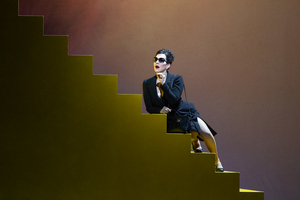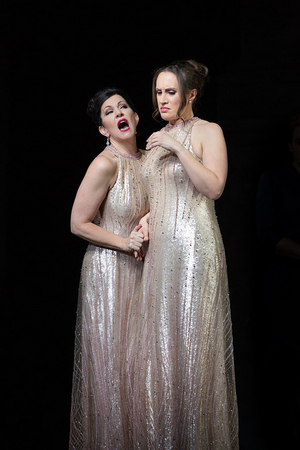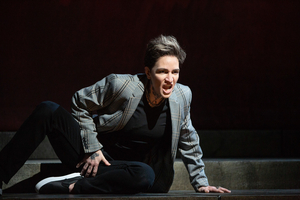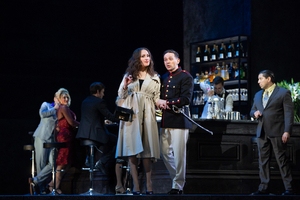Review: DiDonato and McVicar's Take on Handel's AGRIPPINA Have the Met Audience in Their Grip
Conductor Harry Bicket turns Met orchestra into Baroque pit band

Marty Sohl/Met Opera
Welcome to the Met, AGRIPPINA: It's about time.
Handel and his librettist, Vincent Grimani, knew that certain stories are timeless--like corruption in government--and this one has plenty of twists and turns...and even some belly laughs. It was the perfect piece for an ingenious director, Sir David McVicar, and a spectacular singing actress, mezzo Joyce DiDonato, aided and abetted by conductor Harry Bicket and the Met's perfectly Baroque pit band.
The result was an unusual combination for early music: great music and great fun. I suppose that's why it became such a big hit for Handel.
This production by McVicar has been around for a shockingly long time--it debuted in Brussels in 2000 (long before he was a 'sir') before finally sprouting at the Met on Thursday--but it was well worth the wait. McVicar has frequently been chided for productions that are too tame, but he pulled out all the stops here, with the time-addled scenery and costumes by John Macfarlane, lighting by Paule Constable and choreography by Andrew George.
It's hard to believe that the story--which tells of Agrippina's (DiDonato) effort to install her son, Nerone (Nero, mezzo Kate Lindsey), on the throne of Rome)--predates the absurd political climates in the US, UK and elsewhere in our deteriorating world. But under McVicar, Handel and Grimani turned out to be oracles, even turning the Emperor Claudius (the game bass Matthew Rose, sounding good and acting riotous) into a golfer.

Marty Sohl/Met Opera
At last, DiDonato brought her portrait of Agrippina to the Met; it's one that she's done many times during the last year, including a Europe-wide concert version that I heard in Barcelona at the Liceu in May and a production at the Royal Opera in London. Her singing was divine, her comedy chops delicious and dramatics without a flaw. It's hard to see how it's possible that it took so long for it to get her to New York.
Hearing her double-dip the role in so short a time, makes it clear to me that she doesn't have simply one take on it that she drags out when called upon. I could tell that she's still constantly finding nuances in this complex, manipulative character. She never turns her into a cartoon or makes her so unlikeable that she's turned into one of today's miserable politicians who you can only despise. For instance, after Agrippina is accused of trying to manipulate the Emperor, she admits it, but explains that it was all to help him. She did it for him and him alone. LOL. You could tell she almost believes it herself.
It's clearly a role that she relishes. She's a marvel in it--wait for her 'Pensieri, voi mi tormentate'--and impressive doesn't even start to describe her.

But this wasn't a one-woman show. At the top of her cohorts-in-political-crime was mezzo Kate Lindsey in a trousers-role as Agrippina's dopey son Nerone (Nero). She brought to him an over-the-top 'portrait of the numbskull as a young man'--but one who could sing (pardon the pun) the pants off the role. I'd last seen the role sung by a countertenor, but Lindsay makes the horny, coke-snorting wretch completely believable--particularly when's singing to his mother about his love for Poppea ('Come nube che fugge') or to Poppea herself ('Coll'ardor del tuo bel cor') or using enough coke to keep half of Hollywood high for a month.
A standout in one of the smaller but key roles was countertenor Nicholas Tamagna as Narciso (in his Met debut) sang beautifully even when he seemed absolutely clueless about Agrippina's manipulation. Countertenor Iestyn Davies sounded suave but a little too reedy and lightweight as Ottone, who saved Claudio's life at sea, but did a fine job with "Voi ch'udite."
Ottone has been made his heir-apparent until Agrippina decides to intercede in order to put Nerone on the throne [read: put herself in power]. He also is in love with Poppea, along with Claudio and Nerone, making things very complicated indeed.

Marty Sohl/Met Opera
Making her Met debut, soprano Brenda Rae was a puzzlement, in a performance that one could chalk off to opening night jitters. Sometimes she sounded absolutely wonderful, such as her aria in the scene at the end of Act II (in what looked like the bar at a Hyatt), where she has begun to doubt the goodness of Agrippina's intentions. Elsewhere, she sounded underpowered and sometimes barely unhearable.
But make no mistake: Go to this AGRIPPINA for DiDonato, Handel and the production, plus the orchestra under Harry Bicket, who conducted from the harpsicord. We're unlikely to see the likes of it again for a long time.
Additional performances of AGRIPPINA will be on February 9 (matinee), 13, 17, 22, 25, 29 (matinee); March 3, and 7. The running time is approximately 3-½. See the Met's website for casting by date and performance times here.
Reader Reviews
Videos

